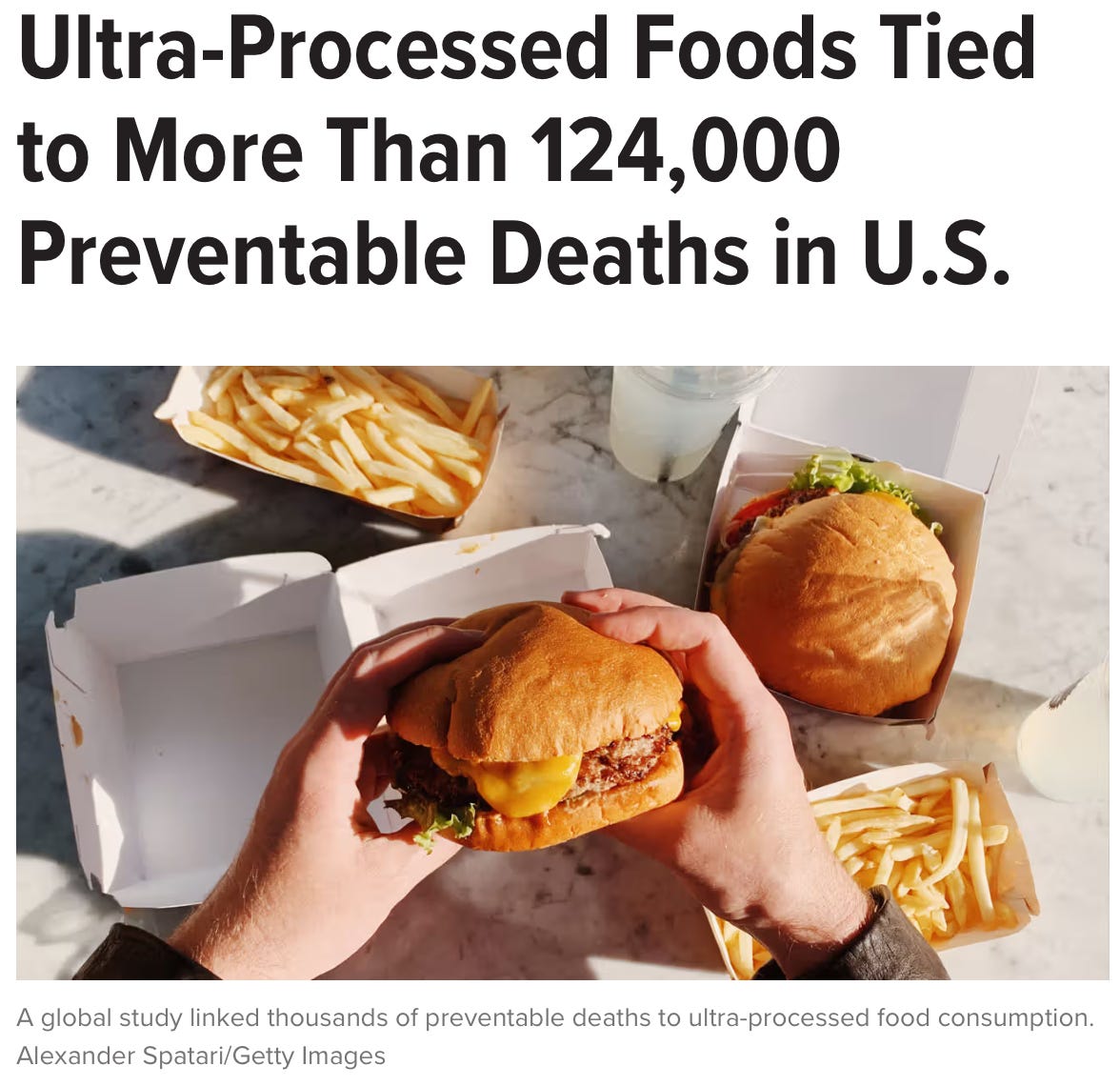When a paper in the American Journal of Preventive Medicine was published in April, headlines were consistent:
Many of the stories referred to UPFs raising risk, causing death, etc. - as if cause-and-effect had been proven, which is not the case.
One of the best analyses came from the Health Nerd Substack, by epidemiologist Gideon Meyerowitz-Katz. His subhead: “Again. According to the headlines. Sigh.”
I hope you read his entire analysis. The key points were summarized in this paragraph:
these numbers are not nearly as solid as you might imagine. The estimates of ultra processed food intake are based on food frequency questionnaires, which are notoriously unreliable. The correlation with premature mortality is based on various statistical models with numerous assumptions, some more reasonable than others. There are many uncorrected confounders that make the associations less likely to be causal than they could be. Overall, the link between ultra processed foods and mortality is, at best, a bit weak, and may not represent a real finding as much as it shows that people who eat a lot of cheap, low-quality foods are less healthy in many ways.
If the numbers were true, he asks ‘What are we supposed to do about it?’
At this point, we’re asking people to almost completely change their diets. Not just the odd meal or two, but pretty much every meal they eat. Get rid of the sauces, start cooking from scratch, eliminate the take-out containers. It’s not impossible, but it’s not a simple ask either.
On top of this, it’s unlikely that we could realistically get people to eat no ultra processed food at all. People in the lowest quarter of ultra processed food intake still get about 16% of their calories from these foods. If we were to largely revolutionize our food system and make ultra processed foods much harder to access - not a bad idea in and of itself - we’d still be eating a reasonable quantity of them because they are just so convenient.
Take packaged, sliced bread from a store, for example.
I’m jumping now to his conclusion, with which I agree:
So yes, you should probably eat less unhealthy food. You can define that in many different ways, but generally if you eliminate the stuff with high levels of fat, sugar, and salt you’ll be on the right track. But the problem of ultra processed food is far more complex than any advice I can give you, and involves all of society rather than simple dietary prescriptions for people like you and me.
The Health Nerd consistently delivers this kind of analysis and I highly recommend his Substack.
The problem with many mainstream media news stories
They were laden with fear, but lacking in critical insight and analysis.
For example, Healthline (pictured above) stated, “Ultra-processed foods could be driving an increase in preventable deaths.” One of my recurring pieces of advice to readers is that whenever you see “could…may…might” in a health news story, feel free to substitute “could not…may not…might not” which, by definition, is also possibly true.
Some online readers of the CNN story made clear what they didn’t get from the news. Whether such comments are on target or not, I always find it helpful to read them because it shows where the journalism is not connecting with its audience. Examples:
“what a ridiculous article accomplishing nothing but scaring people with little to no conclusive causal evidence.”
“What is an ultra-processed food? We are given a nice big word describing unhealthy food, but as usual no specifics. Name name brands. Get all the information out so the public can decide what they wish to eat. So far all I have seen is vague mentions and no definition of a UPF. Did the survey take into account the other forces that cause health problems. Did the people surveyed smoke tobacco, drink any type of alcohol, eat a lot of sugar, live in a high polluted city, etc. Outside factors could be contributing to the issue. What are they? Please, give us real information so the public can make its own informed decision.” (*Note: other possible factors were briefly mentioned, but not until the last paragraph and many readers may not have stayed with it that long.)
Fortune had no independent expert perspective but quoted only the lead researcher - never a good practice in a health news story.
Who did a better job?
From what I saw, the BBC had the best section on caveats and limitations to the study, in a section labeled, “Still questions to answer.”
Medscape included some independent expert analysis that emphasized:
the observational nature of the study and the methods that led to the authors’ conclusions
“arbitrary definitions (of UPFs) and overly broad food categories”
“Changing dietary guidelines based on this study is not warranted.”
Unfortunately, nutrition research news is often some of the most poorly covered health news. Even more unfortunate, a lot of nutrition research is of lesser quality and communicated poorly by researchers.
Food for thought as you consume the news.









Recent mouse studies suggest emulsifiers in UPFs may alter gut microbiota and increase inflammation. Additionally, UPFs reduce satiety signaling, potentially driving overeating beyond their calorie or nutrient profiles.